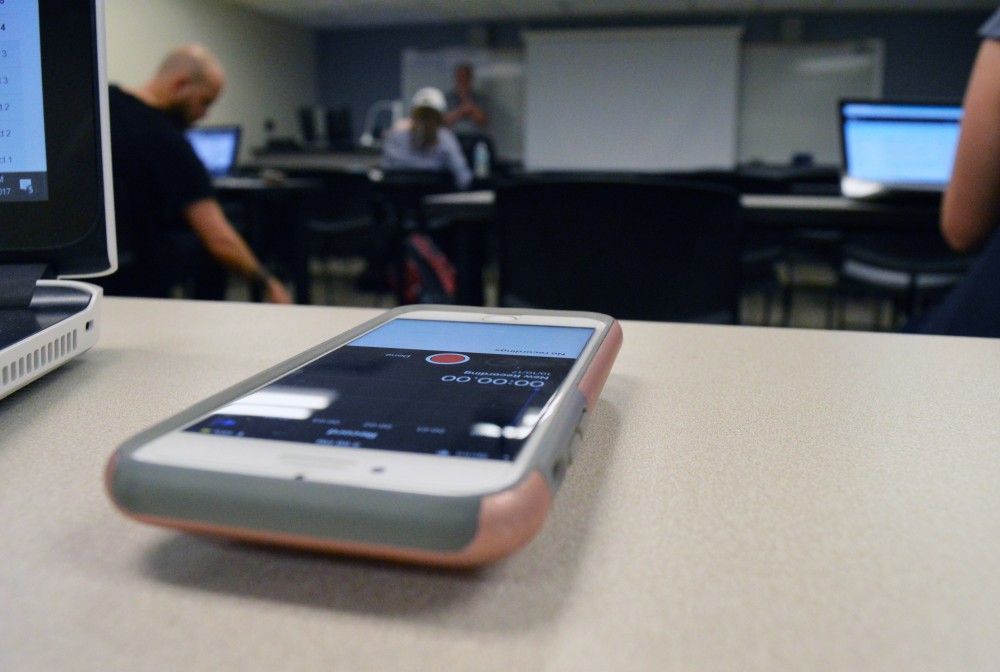GVSU updates lecture-recording guidelines to share with faculty

GVL/Hannah Zajac– Students recording lectures on 10 Oct 2017.
Oct 12, 2017
Grand Valley State University policy states that students do not have a right to record in lectures without permission from the professors. While not all students may know this, GVSU maintains that recording lectures without consent is prohibited.
Edward Aboufadel, assistant vice president for academic affairs at GVSU, has been working on updating language pertaining to this policy and others on the Division of Inclusion and Equity’s “Expressive Activities & Grounds and Facility Use” webpage to share with faculty.
According to a section addressed to faculty on this page, “Students do not have the right to record classroom lectures and discussions without securing prior permission from you, but do have the right to take written notes (or typed notes on a computing device).”
The issue the university faces when recordings are taken during lectures is the lack of consent from the professor and other students in the classroom or lecture hall. When a recording is made, it is out of the speaker’s control what the individual with the recording does with the information. While many students use their recordings to go back and take notes, there is the concern that the video or recording could be released online and the speaker will be taken out of context.
“If you have a situation where there is sort of unfettered recording in courses, one problem you have is they are recording all the other students in the class, too,” Aboufadel said. “Perhaps the student will be quoted out of context; perhaps the professor will be quoted out of context. The faculty can get permission to do this, but the default is no.”
As far as on-campus enforcement of this rule, it really comes down to the professor and students. There is no way for a professor to constantly monitor what students are doing and if they are recording.
“Enforcement is through education,” Aboufadel said. “Faculty has some guidance now on what to say to students about this. … Some faculty will choose to say, ‘It doesn’t matter to me. I’m going to tell students they can record; they should just go ahead.’ Others might just remind everybody of the default policy.”
The student should ask for the professor’s consent before they begin recording, and the professor should make their answer clear to the class. If the professor does not give consent but the student needs to record because of a learning disability or for medical reasons, they should speak privately to the professor and seek aid from GVSU Disability Support Resources (DSR).
“If you have a deaf student, it may be necessary to record what’s happening in the class, and then there are apps that can transcribe into closed caption to allow for students to read what is being said in class,” Aboufadel said.
If there were a situation where a student needed to get a recording of the lecture because of medical reasons, such as a hand injury, which would affect the student’s ability to take notes in class, they could apply to DSR to get the added support they need in the classroom.
Recording a lecture, among other day-to-day issues that come up in classes, often can be solved by communication between the professor and student.
“Knowing all these different policies, it’s difficult for us to get them out to (everyone on campus),” said Stephen Glass, acting vice provost for student affairs and dean of students at GVSU. “But, it all starts with (talking) to the professor. Communicate with your professor, and if you’ve got needs … and something can be done to enhance your learning experience, talk to your professor about it.”
Some professors and students take different stances on what they think is appropriate when it comes to recording lectures.
“I do and don’t agree with the rule,” said GVSU freshman Gloria Neuman. “I can understand that some people would find (it) a helpful tool for studying and can see how it would be useful, but I can also see how it can be misused or shared online, which is unfair to the professor and other students that pay tuition to attend these lectures.”
Many professors are more than willing to let students record during lectures.
“I’m not sure if students do ever record the class, and if they did, I don’t think I would have any problem with it at all,” said Douglas Furton, professor of physics at GVSU. “I view my conduct in class as essentially public behavior.”























